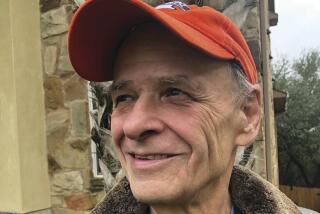‘Out of My Skin,’ by John Haskell
Out of My Skin
A Novel
John Haskell
Farrar, Straus & Giroux: 212 pp., $14
In 1923, the Italian writer Italo Svevo published “Confessions of Zeno,” a novel in which middle-aged businessman Zeno Cosini undergoes psychotherapy to quit smoking. What Cosini loves is that each time he quits, he feels he has been given a new life, a fresh skin. He loves this feeling so much that he becomes addicted to quitting. In a wonderful review of Svevo’s work written in 2002, the critic James Wood called Cosini a modern Don Quixote, referring to the comic-pathetic nature of both novels, in which “the great illusions of freedom that the self hoards” were made plain; “vanity and the sad prospect of an imprisoned self acting as if it were free” being the actual human condition.
In his first book, the story collection “I Am Not Jackson Pollock,” and his novel that followed, “American Purgatorio,” John Haskell has messed around with the idea of the imprisoned self. It makes sense that, as a performer and a writer for the theater, Haskell would explore the possibilities and limits of identity. Referring to the stories in “Jackson Pollock,” in which the writer inhabits Pollock, the pianist Glenn Gould, various Hitchcock characters, Topsy the elephant and Joan of Arc, Haskell has said his books are meant to be read aloud, performed.
“Out of My Skin” fits squarely in the comic-pathetic, imprisoned self literary lineage, with one small problem: It’s not exactly a novel. A novel is part monologue, part marathon. The protagonist plummets through space, transformed, exhausted by the unfolding of events. He grows, mutates, reproduces, has revelations, changes his behavior or stays the same, but does not leave his skin. He is trapped, like all the rest of us, in his self. The novel is a frame, not a mask. It is the skin around the organism, the story.
In “Out of My Skin,” the unnamed narrator moves to L.A. for a month. The book could not be set anywhere else: “What was so great about authenticity? I’d come to Los Angeles to be something different, and whatever failures and defeats, whatever unfulfilled expectations I was leaving back in New York, that was one thing, and this was an opportunity.” He writes a story for the Los Angeles Times on an actor named Scott who earns his living impersonating Steve Martin. Interviewing Scott, the main character learns how to walk like the actor; he dyes his hair white and begins a relationship with a woman named Jane. He feels most comfortable with Jane when he acts and thinks like “Steve.” He’s happy to get rid of his old self; that’s part of the reason he’s decamped to L.A.
After the honeymoon (with Steve) wears off, he finds himself rebelling against not just the prison of self, but the prison of his adopted self. He feels like the motorcycle rebel in “The Wild One” played by Marlon Brando, who, when a townsperson asks “What’re you rebelling against,” says, “Whaddya got?” He flails between identities. He thinks of leaving L.A., heading out to the desert, but thinks, “Los Angeles was my desert.”
The book has Haskell’s signature tone -- a struggle for precision that can sometimes feel like a writing exercise -- combined with a kind of polished insouciance. He’s going to parse his way through the surface of things down to the bone, no matter who’s watching or how long it takes. The beautiful thing is that he never gets there. There is no resolution, no certainty, just a determined plodding, which is somehow never dull.
Revelations animate novels; they give the writer something to pivot on; their utter absence in Haskell’s writing feels modern. Here we are, no religion, no single meaning, just a hall of mirrors that is reality.
At first, needing a box to put it in, I thought “Out of My Skin” was more essay than novel. Haskell adds a love story, which gives the book a shape and a frame and a place to end, but it is secondary to his thinking about the role of the self and the nature of identity. This book is a rebellion against the novel, even as it inhabits the form.
Salter Reynolds is a Times staff writer.
More to Read
The biggest entertainment stories
Get our big stories about Hollywood, film, television, music, arts, culture and more right in your inbox as soon as they publish.
You may occasionally receive promotional content from the Los Angeles Times.






